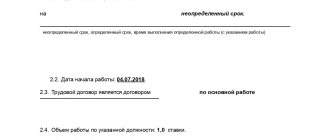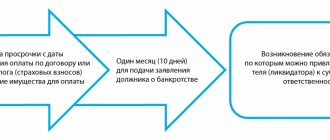Sometimes the actions of an unscrupulous employee lead to a lack of funds or damage to property. If, when hiring him, an employment agreement or contract was signed with him, that is, everything is official, then the employer, on his own legal grounds, can hold this person financially liable. Because the employee, whatever one may say, must bear personal responsibility for his actions. Next, we will consider in more detail all the possible nuances of such unpleasant situations.
To begin, you need to answer the following questions:
- When or why does an employee’s financial liability arise?
- What exactly is this responsibility, what does it include?
- How much responsibility can an employee expect? That is, how and how much he must compensate.
- How to calculate a specific, accurate figure for the damage that he managed to cause?
- How to confirm it, prove it?
- How to reflect this shortage due to his fault in accounting?
- And finally, how much can be deducted from an employee's salary to cover the damage?
When will they be brought to full financial responsibility?
According to the requirements of the law (Chapter 39 of the Labor Code of the Russian Federation), bringing employees to financial liability for causing damage is possible if:
- an agreement on full financial liability has been concluded;
- the absence of valuables transferred to the employee using a one-time document was discovered;
- the harm was caused intentionally;
- the harm was caused while under the influence of alcohol, drugs or other toxic substances;
- the employee’s actions were recognized as criminal by a court verdict;
- he committed an administrative offense;
- information constituting a state, official, commercial or other secret protected by law was disclosed;
- the damage was caused during non-working hours.
It is possible to bring a subordinate to full compensation for damage if a written agreement has been concluded with him on full individual or collective (team) financial responsibility. For the Deputy General Director and Chief Accountant, the responsibility is specified in the employment contract. According to the law, the General Director bears full financial responsibility for the valuables entrusted to him.
But such an agreement is concluded only with employees performing certain types of activities: warehouse employees, cashiers, sellers, etc. The list of such positions and works is given in Resolution of the Ministry of Labor and Social Development of the Russian Federation dated December 31, 2002 No. 85.
The rest (including minors) are liable within the limits of their average monthly earnings (Article 241 of the Labor Code of the Russian Federation), unless this contradicts the requirements of the law.
The employer himself, in accordance with Art. 240 of the Labor Code of the Russian Federation, has the right to refuse to recover losses in whole or in part.
On recovery of training expenses from an employee.
An apprenticeship agreement is not the only type of training agreement concluded between an employee and an employer. The parties have the right to conclude other training agreements (for example, an agreement). Training of employees and their additional professional education are carried out by the employer, including under the conditions specified in the employment contract. At the same time, the employment contract may include a condition on the employee’s obligation to work after training for at least the period specified in the contract, if the training was carried out at the expense of the employer. In case of failure to fulfill this obligation, the employee must reimburse the employer for the costs associated with his training.
Article 249 of the Labor Code of the Russian Federation
provides that in the event of dismissal without good reason before the expiration of the period stipulated by the employment contract or training agreement, the employee is obliged to reimburse the costs incurred by the employer for his training, calculated in proportion to the time actually not worked after completion of training (unless otherwise provided employment contract or training agreement).
When filing a claim in court, the employer must prove the presence of two circumstances:
- the employee and the employer have agreed on the period during which the employee undertakes to work in this organization after completion of training;
- the employee was dismissed without good reason before the expiration of the specified period.
If the listed conditions are met, the court does not have the right to refuse to satisfy the claim, citing, for example, the fact that, as a result of training, the employee did not receive a new specialty or qualification that allowed him to perform a new type of professional activity. By virtue of Art. 196 of the Labor Code of the Russian Federation, the need for employee training (vocational education and vocational training) and additional vocational education for its own needs is determined by the employer. Therefore, the opinion that through training in courses the employee has improved his professional level within the framework of his existing qualifications is unfounded, and therefore the costs incurred by the employer cannot be recovered from the employee (Determination of the Judicial Collegium for Civil Cases of the Armed Forces of the Russian Federation dated April 17, 2017 No. 16- KG17-3).
Note:
The Labor Code of the Russian Federation guarantees reimbursement by the employer of travel expenses for employees sent for vocational training or additional vocational education without work in another area. Such expenses are not included in the costs incurred by the employer for training the employee, and are not subject to reimbursement in the event of dismissal of the employee without good reason before the expiration of the period stipulated by the training agreement.
This conclusion is based on the fact that travel expenses incurred by the employer in connection with sending an employee to vocational training or additional vocational education are an independent group of expenses and relate to compensation (monetary payments) provided to the employee at the expense of the employer in order to reimburse the employee for expenses incurred. related to the performance of labor and other duties, including responsibilities for vocational training or additional vocational education. These costs include:
- travel expenses for the employee to the place of training and back;
- expenses for renting residential premises;
- additional expenses associated with living outside the place of permanent residence (per diem).
The return by an employee of compensation provided to him by the employer (travel expenses) in connection with sending the employee at the expense of the employer for vocational training or additional vocational education is not provided for by the norms of the Labor Code of the Russian Federation.
Travel expenses cannot be recovered from the employee even if the obligation to reimburse them is included in the student contract or agreement on training and reimbursement of expenses.
Example 2
The LLC filed a lawsuit against the employee for reimbursement of expenses related to training in the amount of 1,134,752 rubles. 12 kopecks (including the cost of training - 355,835 rubles. 62 kopecks and travel expenses - 778,916 rubles. 50 kopecks).
To substantiate the stated requirements, the company presented an apprenticeship agreement, an order to send an employee on a business trip to undergo off-the-job training, a travel certificate, an advance report and other documents.
The student contract for training in additional educational programs provided for the obligation to work under an employment contract for three years after completion of training. In case of violation of this condition, the employee had to reimburse the costs incurred by the employer to pay for his training, including funds received by him in connection with the conclusion of the contract, calculated in proportion to the time actually not worked for the employer after training.
The employment contract was terminated under clause 3, part 1, art. 77 of the Labor Code of the Russian Federation (at the initiative of the employee).
The judges decided:
- Taking into account the time not actually worked for the employer after completion of training (764 days) and the cost of training (510,000 rubles), the employee is obliged to compensate the organization 355,835 rubles. 62 kopecks;
- the company's demand for reimbursement of travel expenses (cost of travel to the place of study, daily allowance, cost of hotel accommodation) in the amount of 778,916 rubles. 50 kopecks contradicts labor legislation.
Thus, despite the fact that the Labor Code of the Russian Federation does not contain a specific list of costs that an employee is obliged to compensate in the event of failure to fulfill without good reason the obligation to work after training conducted at the expense of the employer, no less than the period established by the training agreement or employment contract, the employer does not have the right to demand reimbursement of travel expenses, since such a requirement contradicts the provisions of Art. 165, 167, 168 and 187 of the Labor Code of the Russian Federation. This legal position is expressed, in particular, in the Determination of the Judicial Collegium for Civil Cases of the Armed Forces of the Russian Federation dated July 2, 2018 No. 69-KG18-7.
Financial liability: terms of engagement
First of all, it is necessary to prove the guilt of a particular employee and the amount of losses caused by him (Article 233 of the Labor Code of the Russian Federation). The conditions and procedure for bringing to financial responsibility must be observed. Punishment is imposed in cases where:
- the employer suffered direct actual damage;
- the employee’s guilt (intentional or negligent) has been proven;
- an offense has been committed - actions (or inaction) that violate the law;
- a causal relationship has been proven between the behavior of the subordinate and the direct actual losses incurred by the employer.
In addition, when assessing the actions of an employee, it is necessary to take into account cases that relieve him of financial responsibility (Article 239 of the Labor Code of the Russian Federation). These include:
- force majeure (flood, hurricane, etc.);
- normal business risk (or wear and tear);
- extreme necessity or necessary defense;
- the employer has not provided the necessary conditions for the safety of the valuables entrusted to the employee.
What should an employer do?
What should an employer do if an employee tries to recover compensation? You can avoid financial liability in the following ways:
- The manager can prove that the damage was caused due to force majeure circumstances or there was the intent of the employee. Documents must be presented as evidence. For example, this could be expert opinions, testimony of witnesses.
- Inability to exclude damage. For example, the employer had no opportunity to issue a work book on the day the employee was dismissed. In such a situation, the manager must send appropriate notice to his former employee.
The employer can also reduce the amount of compensation payment. To do this, you need to prove that minor damage was caused.
How to register correctly
To confirm that the specified conditions exist, it is necessary to follow the procedure for holding an employee financially liable:
- Establish the amount of damage. The employer is obliged to fulfill this point before making a decision to reimburse the amount from employees (Article 247 of the Labor Code of the Russian Federation). To do this, they organize an inspection (internal investigation) and/or an inventory. For these purposes, a commission is created (Part 1 of Article 247 of the Labor Code of the Russian Federation), which includes specialists from the legal, financial, economic, personnel and security services. Its tasks, as a rule, include establishing:
- absence of circumstances excluding financial liability;
- violation of the law in the actions of an employee;
- the employee’s guilt in causing the damage;
- the relationship between the employee’s actions and the resulting damage;
- direct actual losses of the property owner.
- Requesting a written explanation from the perpetrator (Part 2 of Article 247 of the Labor Code of the Russian Federation). This item is required. If the subordinate refuses or avoids giving explanations, the necessary act is drawn up.
- Drawing up a commission conclusion (act) based on the results of an internal investigation into the causes of damage. The document is signed by all members of the commission. The report reflects the established facts of the inspection and encloses all materials received during the inspection.
- Issuance of an order. This document is drawn up within one month after completion of the inspection and determination of the final amount of damage (Part 1 of Article 248 of the Labor Code of the Russian Federation). The employee reads and agrees with the contents of the order. To do this, under the text of the document, he makes a written note of consent, signs and dates the review.
If the order is not issued within the specified period or the employee does not agree with the conclusions of the commission and refuses to pay for the losses incurred by the employer, and the amount to be withheld is higher than the amount of his average monthly income, the damage caused is recovered in court (Part 2 of Article 248 of the Labor Code of the Russian Federation).
The procedure for receiving compensation from the employer
What should an employee do if he or she suffers damage? First of all, you need to familiarize yourself with local acts on liability, if they exist. They specify the procedure for paying compensation. Then you need to draw up an application and send it to the employer. It is compiled in free form. In it you need to formulate your request, as well as indicate the desired form of compensation. The application must be reviewed within 10 days. This document cannot remain unanswered.
If the manager refuses to pay, the employee has two options:
- Filing a complaint to the labor inspectorate.
- Filing a claim in court. According to the law, an employee does not have to pay a fee when initiating a labor dispute.
Where is the best place to go? When submitting an application to the inspectorate, you must take into account that this body first reviews the application and then checks the employer. Based on the results of the inspection, the manager is issued an order. This is a rather lengthy procedure. By going to court, you can request compensation faster.
IMPORTANT! An employee can also go to court if the employer ignores the procedure for paying compensation established by local regulations. The manager is obliged to follow the internal regulations adopted by the company.
How to recover damages
To withhold losses in an amount less than the average salary of an employee per month, the employer only needs to issue an appropriate order (Part 1 of Article 248 of the Labor Code of the Russian Federation). It is necessary to remember that a one-time deduction of the entire amount from wages is not allowed! Payments must be split in such a way that the amount of one payment is no more than 20% of the monthly salary, and in cases provided for by the Federal Law - 50% until the final reimbursement. The employee voluntarily pays the debt in full or some part of it, or transfers property equivalent to the damaged one, or repairs it at his own expense (Parts 4, 5 of Article 248 of the Labor Code of the Russian Federation). The parties have the right to agree to pay the entire amount in installments.
To prove the existence of an agreement to compensate for the damage caused, an agreement is drawn up. It specifies the amount to be refunded and the deadline for paying the fee.
IMPORTANT!
If the employer violates the established procedure for withholding incurred losses, the employee has the right to appeal his actions in court.
If a subordinate has given a written undertaking to voluntarily compensate for losses and quit, and is not going to compensate for the remaining debt, it is possible to collect it only in court.
Resolution No. 85 and PMO
When developing a PMO, you should be sensitive to the content of Resolution No. 85. When providing for the responsibility of employees related to ensuring the safety of the company’s property, it is necessary to correlate the legality of the requirements of the PMO with the information reflected in this resolution. In addition, it is better to draw up contracts with employees taking into account the DMO template given in Resolution No. 85.
When concluding a DMO with your employees, you will have to not only check the list of positions from Resolution No. 85, but also take into account the types of work specified in it.
IMPORTANT! The more meticulously the employer carries out the preparatory procedures for completing all important papers, the easier it will be in the future to resolve situations related to material compensation for damage. In addition, the employer’s responsible approach to the system for ensuring the safety of his property and the initial detailed study of calculation algorithms for determining the amount of damage (at the stage of concluding an employment contract and DMO) show the employee the degree of his financial responsibility.
An employer may be tempted to play it safe and enter into a DMO with all employees without exception. In this case, he will arbitrarily expand the list of persons with whom, according to Resolution No. 85, it is possible to enter into DMO, and the rights of workers whose profession or work performed are not included in this list will be violated.
In order to avoid recognizing the DMO as illegally concluded and giving the PMO the status of a document that complies with the law, directly in the text or as an appendix to it, it is necessary to list all positions according to the company’s staffing table, the occupation of which by an employee requires the execution of a DMO.
“Unified Form No. T-3 - Staffing Schedule (form)” will help you draw up a staffing table without errors .
Criminal liability
Criminal liability - when the employer violated the law and people were seriously injured.
The prosecutor's office and investigators are investigating the violation. The entrepreneur or director is at this time in a pre-trial detention center or under house arrest. The investigation ends with a trial and punishment in the form of a fine, compulsory labor or imprisonment. The person gets a criminal record.
Criminal liability occurs for the following:
— Violation of labor protection if people were injured or killed under Art. 143 of the Criminal Code of the Russian Federation;
— Dismissal of a pregnant woman or a woman with children under three years of age under Art. 145 of the Criminal Code of the Russian Federation;
— Delay of salary due to selfish purpose under Art. 145.1 of the Criminal Code of the Russian Federation.
Articles of the Criminal Code are not intimidation. Business leaders are punished with real prison sentences for shortcomings in labor safety and delays in salaries.
Results
The employer's financial liability to the employee is established by the labor legislation of the Russian Federation. The employer, as one of the parties to the employment agreement, as well as the employee, bears financial responsibility. It can occur in several situations: illegal deprivation of the opportunity to work, delay and violation of deadlines for payment of wages, caused material (material) and moral damage. In each of these cases, there are different options for monetary compensation.
It is also recommended, with the assistance of trade union bodies, to establish cases of the employer’s financial liability, the amount and types of compensation in the internal local acts of the enterprise: labor and collective agreements, in the form of annexes to them and others in order to protect the rights of the organization’s employees.
Sources: Labor Code of the Russian Federation
You can find more complete information on the topic in ConsultantPlus. Free trial access to the system for 2 days.
Recovery of damages
To recover damages, it is first necessary to establish the employee’s guilt. To do this, an inspection report is drawn up to reflect the amount of losses. Based on the protocol, an act is drawn up, the real monetary value of the damage caused is assessed, confirmed by accounting documents. Having established the amount, we check what type of financial liability the guilty person falls under. If it does not fall under full (the position is not the same and there is no contract), therefore, losses are compensated within the limits of average earnings, which are determined on the day the damage is established. And it is carried out according to the rules of Art. 139 Labor Code of the Russian Federation.
To make deductions from earnings, it is necessary to issue an order, which he/she will familiarize himself with. In some cases, the guilty person agrees to voluntarily compensate for the harm caused.
Administrative fines from the labor inspectorate
The labor inspectorate monitors the rights of workers.
Based on a person’s complaint, inspection specialists come to the employer and check. If the complaint is true, the entrepreneur is brought to administrative responsibility: he is fined and the order tells him what to correct.
Small companies face fines under Art. 5.27 and 5.27.1 Code of Administrative Offenses of the Russian Federation:
— Dismissal without reason, fixed-term employment contract without reason, refusal to take leave, etc. — up to 20,000 for an individual entrepreneur, up to 70,000 rubles for an LLC;
- Refusal to sign an employment contract if a person has started work - up to 5,000 rubles for an individual entrepreneur, up to 20,000 rubles for the director of an LLC;
— Covering labor relations with a contract — up to 40,000 rubles for individual entrepreneurs, up to 200,000 rubles for LLCs;
- Delay of salaries and other payments - up to 30,000 rubles for individual entrepreneurs, up to 100,000 rubles for LLCs;
- Violation of labor protection and special assessment of workplaces - up to 40,000 rubles for individual entrepreneurs, up to 200,000 rubles for LLCs.
Agreement
There is no prescribed form of limited liability agreement. The provisions are included as separate conditions in the employment contract or agreement; it is concluded in writing.
The agreement can be drawn up in the following form:
- names of the parties;
- employee information;
- information about the employee’s obligation to compensate for damage;
- term, compensation algorithm;
- signatures of the parties.
Illegal deprivation of the opportunity to work
Each employee, in accordance with the employment contract, internal labor regulations and job descriptions, is obliged to comply with the work schedule and fulfill his job duties. The employee must confirm his absence from work with valid reasons: sick leave, a certificate from law enforcement and judicial authorities, medical, educational institutions, and so on. An unconfirmed absence is considered absenteeism, for which the employee can be fired by order of the head of the company.
On our website you can order the dismissal of an employee for absenteeism “Order for dismissal for absenteeism - sample.”
But there are cases when an employee is physically unable to begin performing his job duties due to certain actions of the employer. These include:
- Illegal removal of an employee from work without valid reasons.
- Unlawful dismissal of an employee.
- Refusal of the employer to reinstate the employee in his workplace following a court decision.
- Delay in issuing a work book, making erroneous entries in the document, including the reasons for the person’s dismissal.
The first 3 points are also called forced absenteeism. In all four cases, the employee has the right to payment of lost earnings, which could have been paid to him while he was in the workplace and performing his labor functions. In case of forced absenteeism, an employee can also count on monetary compensation for moral damage.
You will learn how to properly pay for forced absenteeism from our article “Forced absenteeism due to the fault of the employer under the Labor Code of the Russian Federation (payment).”
Compensation amount
Labor legislation establishes the limits of limited liability by the amount of the employee’s average monthly earnings. If the damage is caused in an amount corresponding to the average monthly income or less, the amount of losses is fully compensated to the employer. If losses exceed the established liability limit, only the amount corresponding to the average monthly income is subject to compensation. The remaining amount is written off as a loss.
An important limitation is that the average salary is determined as of the date the damage was discovered. To determine the average income, it is necessary to take into account all types of payments available to the employer based on the salary actually received and the time actually worked for the 12 months that precede the date of loss.
The compensation algorithm for limited liability consists of withholding (after taxes) a certain amount from the employee’s income. However, the Labor Code of the Russian Federation establishes a maximum amount of deductions for each employee receiving a salary of no more than 20 percent.
For example, an employee caused damage to the employer in the amount of 50,000 rubles. Monthly income after deducting personal income tax is 30,000 rubles. The employer will be able to recover losses of no more than 30,000 rubles. At the same time, he has the right to withhold only 20 percent of his salary every month, that is, 6,000 rubles. Thus, the subordinate will make up for the employer's loss after 5 months.
Age aspect of PMO
When describing in the PMO the principles of compensation for material damage by employees, it is necessary to take into account such an important factor as their age.
The conditions for the recovery of damages from minor employees in the PMO must be specifically stipulated. The category of workers “under 18 years of age” requires employers to take the most careful approach. For example, a DMO concluded with such an employee will not have legal force, and forcing a minor employee to fully compensate for damages is illegal.
IMPORTANT! Art. 244 of the Labor Code of the Russian Federation allows for the conclusion of DMO only with employees of the “18+” category, whose work is directly related to money and commodity values.
However, labor legislation, for example Art. 242 of the Labor Code of the Russian Federation, also protects the interests of the employer, limiting the degree of impunity for workers in the category “under 18 years of age” depending on the condition they were in at the time of damage to the employer’s property.
For example, if the company’s assets were damaged by the actions of a minor employee who was in an inadequate state (under the influence of drugs, alcohol or toxic substances), as well as as a result of his committing a crime or administrative offense, the damage is subject to compensation in full.
Other employees over 18 years of age are equal before the law and compensate the damage caused to the employer in accordance with the obligations assigned to them and the conditions of the concluded DME.
Formalization of the agreement
When hiring, a contract is drawn up. This doesn't apply to every worker, but positions such as salesperson or cashier come with financial responsibilities.
The document comes into force after it is signed by the parties and contains a clear description of the obligations of the parties and their rights, possible methods of collecting damages and other necessary conditions.
Delay in payment of wages to staff
Delay in payment of wages is one of the most common labor violations, especially in commercial enterprises. Art. 136 of the Labor Code of the Russian Federation establishes the payment of wages once every half month, that is, in fact, every 2 weeks. Payment once a month is considered a violation of labor laws. Therefore, enterprises work according to the “advance – final payment” scheme. The employer can specify the terms of payments in the internal labor regulations, collective and labor agreements.
What is an advance and what are the rules for paying it, learn from this article.
Art. 236 of the Labor Code of the Russian Federation establishes the right of employees to monetary compensation for violation of deadlines in the form of one three hundredth of the refinancing rate of the Central Bank of the Russian Federation from the delayed amounts. Calculation begins on the day following the established day of payment of earnings. For example, the payment day is set on the 9th, the next day - the 10th - is already considered a day of “delay”, from this moment the employee has the right to monetary compensation. The actual day of payment of wages is also included in the compensation calculation period. In this case, the amount of compensation can be increased and fixed by internal local acts of the organization.
However, if the delay in payment of wages did not occur through the fault of the employer, for example, due to technical problems of the servicing bank, and he proves this fact, then he is not obliged to pay monetary compensation to the staff.







